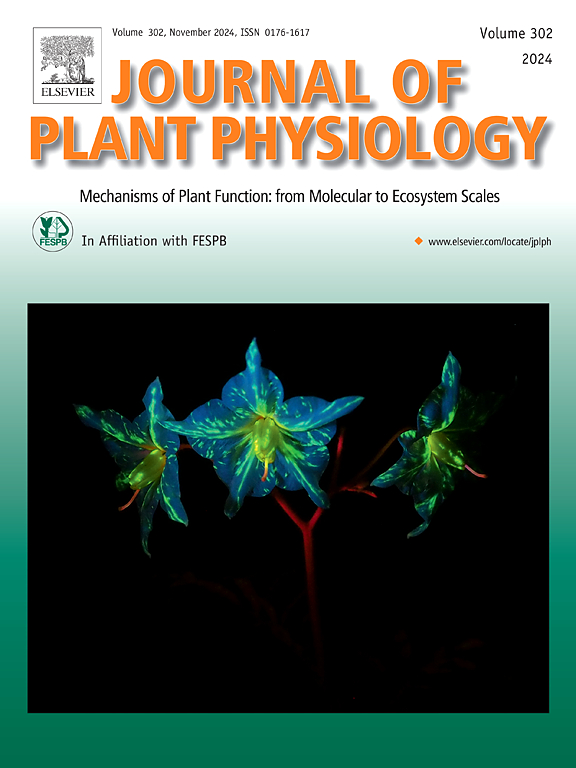壳聚糖-硫脲及其衍生物:赋予耐旱性的应用和作用机制。
IF 4
3区 生物学
Q1 PLANT SCIENCES
引用次数: 0
摘要
全球气候条件不断变化,非生物胁迫日益加剧,包括干旱、极端温度、盐度、风暴、污染物和洪水,这些都对作物栽培和可持续发展造成了威胁。为了减轻这些影响,许多合成和非合成化学品或植物生长调节剂被广泛使用。壳聚糖(一种富含氮和碳的天然有机物)和硫脲(一种含硫和氮的合成植物生长调节剂)因其在增强植物抗逆性方面的作用而备受关注。尽管它们被广泛使用,但其确切的作用机制仍不清楚。为此,本综述探讨了壳聚糖和硫脲如何促进作物的抗逆性,尤其是在干旱条件下,以提高产量和可持续性。本综述还探讨了硫脲作为硫化氢(H2S)供体的潜力,以及硫醇化壳聚糖衍生物和壳聚糖-硫脲组合的可能应用,强调了它们的生物功能和对可持续农业的益处。本文章由计算机程序翻译,如有差异,请以英文原文为准。
Chitosan-thiourea and their derivatives: Applications and action mechanisms for imparting drought tolerance
The increasing abiotic stresses from changing global climatic conditions, including drought, extreme temperatures, salinity, storms, pollutants, and floods, impend crop cultivation and sustainability. To mitigate these effects, numerous synthetic and non-synthetic chemicals or plant growth regulators are in practice. Chitosan, a natural organic substance rich in nitrogen and carbon, and thiourea, a synthetic plant growth regulator containing sulfur and nitrogen, have garnered significant interest for their roles in enhancing plant stress tolerance. Despite extensive use, the precise mechanisms of their actions remain unclear. Towards this endeavor, the present review examines how chitosan and thiourea contribute to stress tolerance in crop plants, particularly under drought conditions, to improve production and sustainability. It also explores thiourea's potential as a hydrogen sulfide (H2S) donor and the possible applications of thiolated chitosan derivatives and chitosan-thiourea combinations, emphasizing their biological functions and benefits for sustainable agriculture.
求助全文
通过发布文献求助,成功后即可免费获取论文全文。
去求助
来源期刊

Journal of plant physiology
生物-植物科学
CiteScore
7.20
自引率
4.70%
发文量
196
审稿时长
32 days
期刊介绍:
The Journal of Plant Physiology is a broad-spectrum journal that welcomes high-quality submissions in all major areas of plant physiology, including plant biochemistry, functional biotechnology, computational and synthetic plant biology, growth and development, photosynthesis and respiration, transport and translocation, plant-microbe interactions, biotic and abiotic stress. Studies are welcome at all levels of integration ranging from molecules and cells to organisms and their environments and are expected to use state-of-the-art methodologies. Pure gene expression studies are not within the focus of our journal. To be considered for publication, papers must significantly contribute to the mechanistic understanding of physiological processes, and not be merely descriptive, or confirmatory of previous results. We encourage the submission of papers that explore the physiology of non-model as well as accepted model species and those that bridge basic and applied research. For instance, studies on agricultural plants that show new physiological mechanisms to improve agricultural efficiency are welcome. Studies performed under uncontrolled situations (e.g. field conditions) not providing mechanistic insight will not be considered for publication.
The Journal of Plant Physiology publishes several types of articles: Original Research Articles, Reviews, Perspectives Articles, and Short Communications. Reviews and Perspectives will be solicited by the Editors; unsolicited reviews are also welcome but only from authors with a strong track record in the field of the review. Original research papers comprise the majority of published contributions.
 求助内容:
求助内容: 应助结果提醒方式:
应助结果提醒方式:


